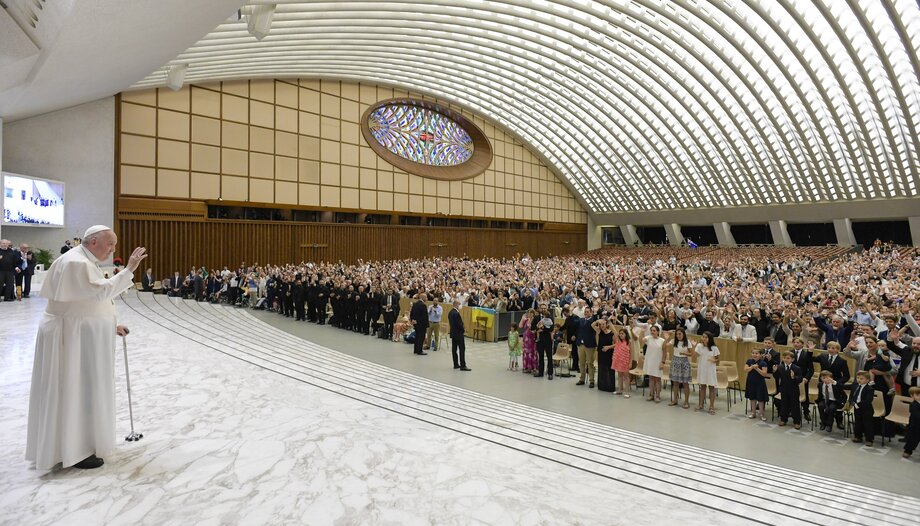"In the Church there must always be services and missions that do not have a purely local character, but serve the mandate that invests the global ecclesial reality and the propagation of the Gospel. The Pope has need of these services, and they have need of him, and in the reciprocity of the two types of mission the symphony of ecclesial life is realized." These are the words of the then Cardinal Joseph Ratzinger, pronounced in 1998 at the World Congress of Ecclesial Movements promoted by the then Pontifical Council for the Laity.
25th anniversary of the Congress
Twenty-five years after that meeting, in which the Prefect of the Congregation for the Doctrine of the Faith explained the "theological place" of the ecclesial movements in the Church, confessing that he himself had experienced, in the early 1970s, the impetus and enthusiasm with which some of them (e.g., the Neocatechumenal Way, Communion and Liberation, the Focolare) lived the joy of faith. On June 22, the annual meeting with the moderators of international associations of the faithful, ecclesial movements and new communities, convened by the current Dicastery for the Laity, the Family and Life, took place in Rome.
Dozens of representatives of the most widespread ecclesial movements from various countries throughout the Church gathered in the Aula Magna of the Jesuit General Curia, just a few steps from St. Peter's Square, to reflect on the subject "On mission with Peter. Apostolicity at the heart of the identity of the movements".
The vocation of the movements
Before the meeting, participants were invited to reread the same lecture by Joseph Ratzinger to reflect on the specific "vocation" of ecclesial movements within the mission of the Church.
On that occasion, the Bavarian theologian, who later became Pope, affirmed: "In history, apostolic movements appear under ever new forms, and necessarily so, since they are precisely the response of the Holy Spirit to the changing situations in which the Church finds herself. And, therefore, just as vocations to the priesthood cannot be produced or established administratively, much less can movements be organized and launched systematically by authority. They must be given, and they are given.
He then made it clear that "those who do not share the apostolic faith cannot claim to carry out apostolic activity"; to it must be "necessarily united the desire for unity, the will to be in the living community of the whole Church". And he added: "the apostolic life, moreover, is not an end in itself, but gives the freedom to serve".
Gospel, mission and service
In inviting the assembly, the Cardinal Prefect of the Dicastery for the Laity, the Family and Life, Kevin Farrell, underlined the three essential elements highlighted at the time also by Ratzinger: evangelical life, missionary outreach and service, as a challenge also for the present times, in which "keeping apostolicity alive in the Church is certainly a great gift, but it is also a task that is not always easy for the movements themselves to fulfill."
Among the obvious risks are the loss of the desire to serve, the loss of the sense of one's own charism, of the missionary impulse and of openness to the whole world, as well as the loss of the link with Peter by entering into conflict with the Church.
The representatives of the various movements and communities shared their reflections and testimonies on these challenges, responding in particular to how they try to live a true apostolicity of life, through what initiatives of proclamation, preaching, charity and service, reasoning also on the obstacles to the mission and the bold and creative impulse for a possible renewal of structures, styles and methods.
The introductory report was instead entrusted to Father Paolo Prosperi, of the Priestly Fraternity of the Missionaries of St. Charles Borromeo - founded in 1985 by Bishop Massimo Camisasca, one of the first disciples of Father Luigi Giussani, founder of the Communion and Liberation movement - who spoke about the theological position of the movements in the magisterium of the Popes, starting from the first reflection of Pope Ratzinger.









